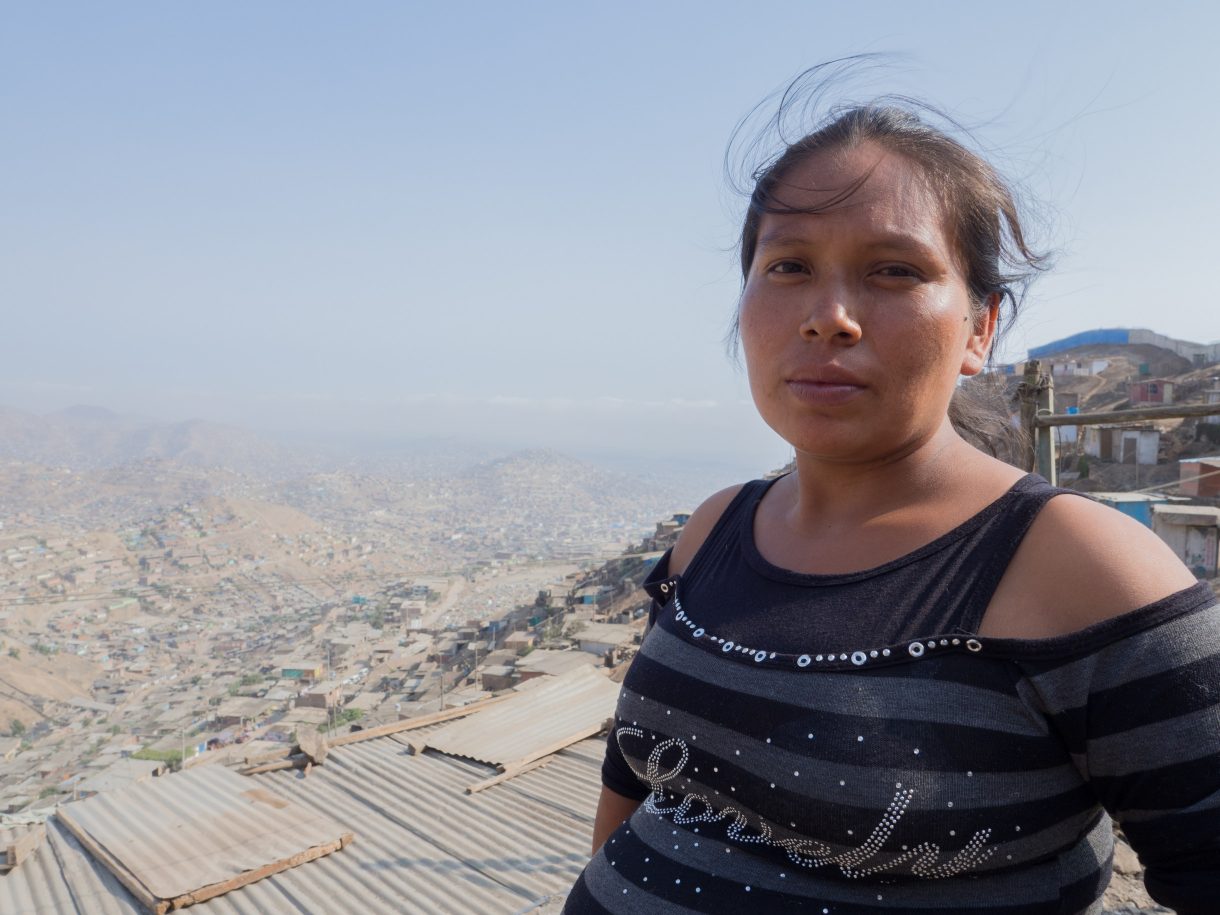A precarious life
 Lacking roads and vehicles, residents of San Juan de Miraflores carry everything they need for their homes up the mountainsides on foot. Photo: Elizabeth Stevens / Oxfam America
Lacking roads and vehicles, residents of San Juan de Miraflores carry everything they need for their homes up the mountainsides on foot. Photo: Elizabeth Stevens / Oxfam America
On a Peruvian mountainside, local people face down danger with knowledge, solidarity, and grit.
Ever since I got back from Peru this spring, my thoughts have been returning to San Juan de Miraflores.
San Juan is a district of Lima. As the crow flies, it’s just a few kilometers from the city center. San Juan’s lower reaches look like normal city streets in a down-at-heels neighborhood, but on the bare, windswept mountains above the city are thousands upon thousands of makeshift houses, each perched on a small, homemade terrace. You would think these homes looked precarious even if you didn’t know that Peru is is jolted by earthquakes many times every year.
I was there with a small group of Oxfam staffers and partners to see the results of our work to help local leaders reduce the risks that earthquakes and diseases like dengue pose to these informal communities. Our truck went as far up as it could go, and we went on by foot, making our way up a slope so steep it was sometimes hard to keep our footing.
We stopped at the home of Anali Yupanqui.
Yupanqui is a single mother of two young children; at the time of our visit, she was about to give birth to her third. She lives with her daughters in a tiny shack with a dirt floor and a corrugated metal roof. Half the walls are made of plastic—the carved-up remains of a sign promoting a political candidate she has no particular interest in. She makes enough money to feed her family doing odd jobs like cleaning houses and selling homemade chocolate candies, but—like her neighbors—she can’t afford to pay rent, so she has settled in an area considered uninhabitable. The city doesn’t invest in informal settlements like these, so she has no running water, sewage, or safe source of electricity, and every time she needs to run an errand, she has to hike up or down a mountain.

A parent’s nightmare.
Yupanqui’s husband recently died of dengue, a disease carried by mosquitoes that thrive in settings like this one, where water—instead of flowing out of taps as needed—sits in containers and provides them with perfect breeding grounds.
Lack of running water, said Rosario Quispe of Oxfam partner PREDES, makes living here a daily emergency.
But in the midst of the unimaginable pressures of her daily life, Yupanqui has stepped into leadership in her community. She is the head of her settlement’s governing board, and she is getting things done—facilitating everything from community building projects to trainings in how to put out fires, build retaining walls, and prevent dengue.
Sometimes board members have used their authority to dupe newcomers into paying them rent. But, said Yupanqui, “This board opposes land trafficking. There are people who are upset about that.” So upset that they have threatened her life. “Now, at night we wear whistles when we go outside. If someone blows a whistle, everyone comes out of their houses to help. There is a lot of solidarity here.”
“PREDES has helped us learn how to prevent mosquitoes from breeding,” she said. “Now, we try to seal our water containers.” Here in San Juan de Miraflores, she adds, PREDES is a group people trust.

PREDES also works to help the mountainside communities manage evacuations, first aid, and search and rescue in the event of earthquakes. They work closely with City Hall and people there like Hector Falla, a government risk-management trainer we met who visits the informal settlements often to see what can be done. Falla wants to see city services extended to the mountainside communities, but until that happens, he’s making sure everyone is ready for the worst. He leads trainings on topics like how to fight a fire when you have no water, and emergency simulations to be sure everyone has practice in exiting the scene of a disaster. “Some of our communities are hard to reach,” he said. “They are located on mountainsides and there is no access by road. We work to prepare them so they can face the emergencies themselves.”
“Community members,” he said, “are the first responders.”
From Yupanqui to Quispe to Falla and beyond, local and national humanitarian leaders around the world are doing their best to manage disasters, but, says Frank Boeren, Oxfam’s country director in Peru, they could use a hand from the international community.
“We all need to invest in local leaders,” said Boeren. “These are the people who really save lives at times of emergency.”
Yupanqui and I climbed farther up the hill and looked out across the valley, and she suddenly smiled. “Things will get better,” she said. “I’m going to work twice as hard to help my children have better lives.”
What do you say in the face of so much hardship and so much courage?